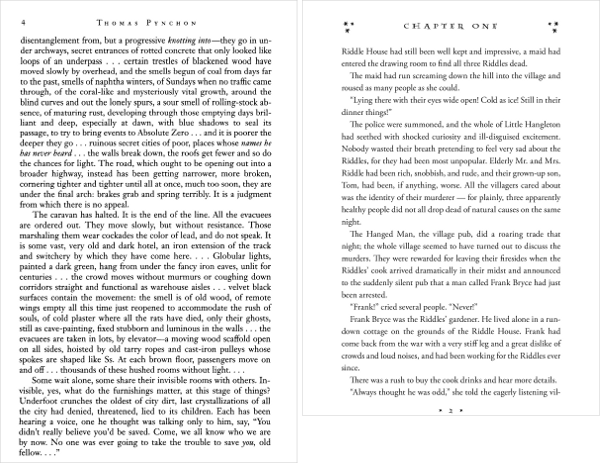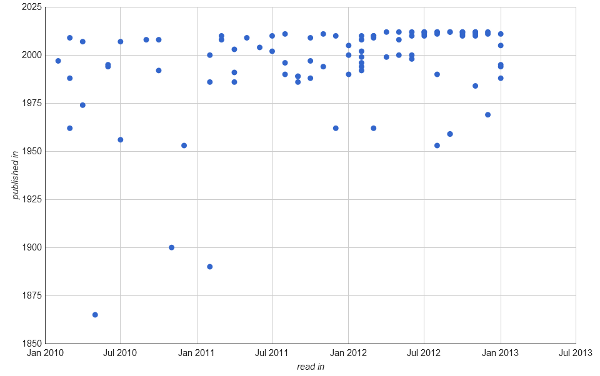2013 Hugos
The nominations for the 2013 Hugo Awards were announced last week. The Hugos, while probably the most recognizable and representative award for science fiction and fantasy fandom, are also still, you know, awards. Like all awards everywhere and for everything, there is an inevitable and usually entertaining backlash consisting of usually pretty high profile folks railing against what they perceive as mediocrity. For a superb example of this sort of thing, see Christopher Priest’s takedown of last year’s Clarke Award nominees (the Clarke is a British SF&F award, and Priest’s polemic hit especially hard since, you know, he’s an upstanding author who has won the award in the past). Filled with just the right amount of invective and hyperbole that it’s entertaining and funny without seeming like he’s just some old crank. Will this year’s Hugo backlash fare as well? It’s still early in Hugo season, but things have certainly started off with a bang, as Justin from Staffer’s Book Reviews asserts that the Hugos are “utter twaddle”:
…the Hugo voter has a certain style it looks for in its fiction. Hugo-style, if you will, is like Gangnam-style only without the distracting Korean guy riding a horse, replaced with Charles Stross and Connie Willis on a podium holding a… rocket ship. I admit Gangnam-style doesn’t have nearly as much sex appeal. In other words, Hugo nominated books tend to be recognizable. On the one hand because they are mostly written by Stross, Willis, John Scalzi, China Mieville, Robert Charles Wilson, Lois McMaster Bujold, Ian MacDonald, and active members of the Live Journal community, but also because they fit a certain motif that’s difficult to pin down. I’ll fall back on the old pornography argument, “I know it when I see it.”
None of this accusation of style is a criticism of the award, quite the contrary. I believe the populist nature of an award like the Hugo is vitally important. It captures the kinds of novels that more elitist awards fail to – books people love to read. I’ve tried several times to read John Crowley’s Little, Big (which was, ironically enough, nominated for a Hugo in 1982) and it just isn’t any fun. Like Little, Big though, the best novel category almost always has a wild card – something that doesn’t quite fit in to the Hugo mold – and sometimes they win. These winning standouts usually represent something that can’t be ignored for societal (Windup Girl), cultural (Among Others), or inferiority inferiority complexacle (The Yiddish Policeman’s Union) reasons.
So far, so good, and not too critical, though you can see the beginnings of his ultimate problem with the Hugos up there in that first paragraph. After giving two examples of worthy novels that weren’t nominated (Elizabeth Bear’s Range of Ghosts, and NK Jemisin’s The Killing Moon), he starts to get to the heart of the matter.
Books like Bear’s and Jemisin’s are missing not because they aren’t good enough or even because they aren’t the kinds of books Hugo voters support, but because of an impenetrable culture of voting habits that precludes them from being part of the discussion. Those habits involve Lois McMaster Bujold, John Scalzi, and (of late) Seanan McGuire who are as likely to be nominated for a Hugo as Barrack Obama is to be heckled at the San Antonio Stock Show & Rodeo.
In essence, anyone who follows the Hugos, even just in the Best Novel category, is bound to notice the same 6-7 names popping up year after year. The aforementioned Stross, Willis, Scalzi, Mieville, Wilson, Bujold, MacDonald, etc… It looks like we can add Seanan McGuire (aka Mira Grant) to the list, as she’s made the shortlist for the past three years due to her Newsflesh trilogy of zombie books. And there are plenty of others who don’t publish often enough to achieve that sort of repetition. The question that is being raised is not whether or not these are good authors, but whether or not every single work each of these authors produce needs to be nominated. The argument becomes a little more pronounced in some of the other categories, like the Dramatic Presentation, Short Form (i.e. TV shows):
….best dramatic short form can be summarized in one sentence: why does an award exist when 60% of the nominees year in and year out are from one creative enterprise?
He’s talking about Doctor Who, which has garnered at least 2 and usually 3 nominations per year since it was rebooted in 2006 (and has won the award every year except for one, when the Hugo went to another frequent nominee, Joss Whedon, for his admittedly worthy Dr. Horrible’s Sing-Along Blog). In fairness, as someone pointed out in the comments, this could very well be due to the way in which television is distributed. The Hugos are, technically, a worldwide award, and Doctor Who is actually distributed pretty well around the world, often airing at the same time or only a week or two later. Other shows air seasons in different years, etc… which makes it hard for some of them to gain traction. Anyway, similar arguments can be made for some of the other categories, some of which don’t really change at all from year to year (particularly the “fan” categories, though I get the impression that that is a bit too insular for even me to care about).
It’s a fair point. I mean, I know that Neil Gaiman is a good author, do we need to nominate everything the dude does? The post takes a pretty critical eye on recent Kaedrin favorite Lois McMaster Bujold, perhaps unfairly comparing her to Heinlein, but on the other hand, Justin is dead on when he wondered why Cryoburn needed to be nominated. I like the book just fine, but it’s pretty clear why it was nominated: it was the first entry in a beloved series in 10 years. People were just so happy to spend some more time with (the admittedly great character of) Miles Vorkosigan that they just went and nominated the book, almost automatically. Again, I enjoyed the book, but I’d put it somewhere towards the middle of the pack of Bujold’s work, nowhere close to that amazing late 90s run starting with the Hugo winning Mirror Dance and finishing with the Hugo nominated A Civil Campaign (which had quite stiff competition that year). I think you could make the same argument against this year’s nominee, Captain Vorpatril’s Alliance, though I think that one is a step above Cryoburn.
The problem with all of this, of course, is that there is no real solution. Sometimes an author legitimately goes on a tear of great writing. Justin seems to think highly of Heinlein, who went on his own tear of frequent nominations/wins in the late 50s and early/mid 60s. Will Bujold or Mieville prove to be as influential or long-lasting as Heinlein? Well, that’s sorta missing the point, isn’t it? I’m sure someone in the 60s was all “Heinlein is a good author, but what about all that weird polyamorous sex crap? Do we need to nominate him every year?”
To be perfectly honest, I don’t read enough newly published SF/F to really say that this year’s slate is good or bad. I’ve read two of the nominees: Redshirts and Captain Vorpatril’s Alliance. I liked both of these books, and managed to read through them really quickly, but I would not have been surprised at all if they weren’t nominated. It’s not that they’re bad – they’re both good – but it’s hard not to take Justin’s point to heart. Are people nominating these books because they’re really the best books, or because Scalzi and Bujold are super popular? Of the other three nominees, the one I’m most likely to read is 2312, by Kim Stanley Robinson (incidentally, this is his 5th nomination), and from what I’ve seen, I’d probably be better off reading Robinson’s Mars trilogy. I’m not going to read Blackout because I’m fucking sick of zombies and it’s the third book in a series, and Throne of the Crescent Moon is a fantasy, which is fine, but I’d rather spend my time catching up on other fantasy stuff.
So this post contains a lot of whinging and not a whole lot of real, genuine insight. I’m not really in a position to refute Justin’s position, and I can certainly see that he’s correct, but on the other hand, I don’t know that it’s the worst thing evar either. A lot of this seems like shouting at gravity to me. Yeah, you see a lot of the same authors from year to year. This is going to happen on a populist award list, and the authors do change over time. The grand majority of the frequent nominees mentioned in this post emerged in this century, with a few having started in the 1990s. Some (Seanan McGuire) have emerged in the past few years. I would certainly welcome fresh and interesting nominees, but it doesn’t really bother me to see the likes of Scalzi and Bujold either. Ultimately, it’s all a subjective enterprise, so while it’s fun to read cranky responses to the ballot, we should probably keep in mind that just because something you don’t like was nominated doesn’t mean the whole enterprise is doomed.
And, just for fun, some miscellaneous thoughts on the Hugos:
- There is a lot of angst around the dearth of short story nominees (two of which are available online for free), due to a Hugo rule that in order to be nominated, an entry must receive at least 5% of the vote (and there’s a minimum of 3 nominees, so it’s possible, though probably unlikely, that no short story received 5% of the vote this year). This is apparently not unheard of, especially in the short story category, which is more varied and less talked about than other categories. Cheryl Morgan has the details on the 5% rule and a cautionary tale too.
- Morgan also notes that this year’s Hugo ballot “has been submerged in a terrifying flood of girl cooties.” Women took 11 of 18 nominations in the fiction categories, with the aforementioned Seanan McGuire nominated for 4 fiction awards (she’s also nominated for the podcast award).
- In other awards news, the 2012 BSFA Award Winners were recently announced, including Jack Glass for Best Novel (been in the queue a while, but only because it wasn’t available in the states!) and the self-published Adrift on the Sea of Rains, by Ian Sales (which I did not particularly love, but which was well done for sure).
And that’s all for now. I should probably get back to reading some SF instead of wanking about it on the internet.



